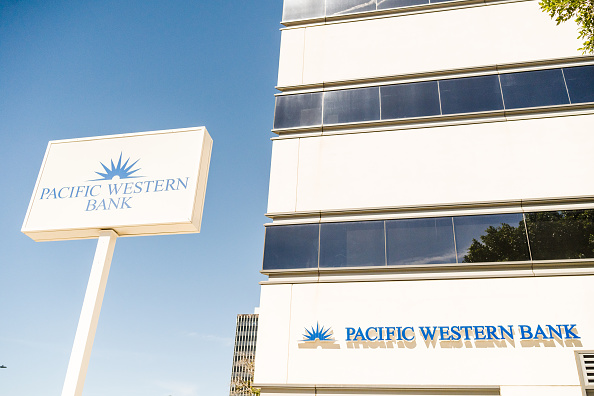(LOS ANGELES) — Shares of PacWest Bancorp plunged more than 50% in early trading on Thursday, marking the latest spasm of financial distress after three of the nation’s 30-largest banks fell within a matter of weeks.
In all, PacWest stock has fallen more than 85% this year, erasing hundreds of millions of dollars in value.
The Los Angeles-based midsized lender is exploring “all options” as it weighs offers from potential investors as well as the sale of a $2.7 billion loan portfolio, PacWest said in a statement on Wednesday.
However, the company rejected concern about a sudden run on deposits, saying it has “not experienced out-of-the-ordinary deposit flows” since the seizure and sale of First Republic on Monday.
Deposits, PacWest said last month, increased nearly 4% over an 11-day period in late March, even after the collapse of Silicon Valley Bank had set off financial uncertainty.
As the Fed aggressively hiked interest rates over the past year, the value of long-term Treasury and mortgage bonds dropped, punching a hole in the balance sheets at some regional banks.
The failure of Silicon Valley Bank in March sent shockwaves through the financial system that days later helped bring down New York City-based Signature Bank. On Monday, First Republic fell under government control before a sale to JPMorgan Chase.
While high interest rates contributed to the collapses, each of the banks also retained a sizable portion of uninsured depositors, who tend to panic without a government backstop for their funds.
PacWest appears to fit the mold, since its balance sheet carries securities vulnerable to high interest rates and a share of its deposits are uninsured, Greg Nini, a finance professor at Drexel University, told ABC News.
“The important ingredients are those fundamentals,” he said. “It sure sounds like collapse is possible.”
PacWest has not responded to ABC News’ request for comment.
The distress at First Republic earlier this week delivered some “knock-on effects” that further destabilized the bank, Nini added.
Addressing concern about deposits that lack government protection, PacWest said on Wednesday that insured deposits make up 75% of its holdings, which marks a sharp increase from the end of last year, when just 48% of its deposits were insured.
Despite rising fear about the fate of PacWest, the significant portion of guaranteed deposits should prevent the bank from sliding into failure, Julian Vogel, a finance professor at San Jose State University, told ABC News.
“I really don’t think it should be on the brink. Those people’s money is absolutely safe,” Vogel said. “Even if the company goes down, they will get their money, period.”
“While I understand that the drop in stock price can be fear-inducing, it’s not necessarily related to the overall performance of the company on a day-to-day basis.”
Stock prices at other regional banks dropped in early trading on Thursday, suggesting that the financial fallout was not limited to PacWest. Phoenix-based Western Alliance Bancorp shares plummeted about 32%; while Salt Lake City-based Zions Bancorp fell 8%.
Since the banking trouble has been largely concentrated at regional lenders located in the Southwest, depositors could be spreading concern through word of mouth, Vogel said.
“They’re all in the same region, which means that the people that have money in PacWest likely know their neighbor or friend or somebody from the gym that has money with banks affected by First Republic or Silicon Valley Bank,” he said.
The outcome at PacWest marks a “very pivotal” moment for the financial system, Vogel said.
“This is the first time that we’re seeing a bank that really shouldn’t have anything to worry about,” Vogel said. “It’s a solid company. Depositors are mostly insured.”
“If consumers keep panicking,” he added. “Then this could be the start of a new phase and there will be a lot more ahead.”
Copyright © 2023, ABC Audio. All rights reserved.












